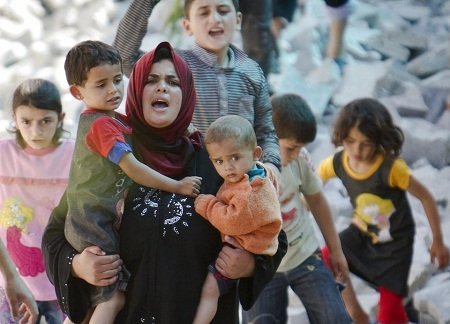UNRWA Commissioner-General Pierre Krähenbühl said on Monday that 60% of Palestinian refugees in Syria have either been displaced internally or “become refugees a second time over” in neighboring countries since the conflict began. Krähenbühl, who spoke at the UNRWA Advisory Commission Meeting in Jordan Monday, said that between 16,000 and 18,000 Palestinians are “still trapped, living in hunger, cold and constant fear” in the Yarmouk camp in southern Damascus, besieged by regime forces for more then a year and a half. UNRWA has experienced increasing difficulty bringing supplies into the camp since the summer, he said. On the topic of education, Krähenbühl said that more than two-thirds of UNRWA’s schools in Syria have become “unusable,” either damaged by fighting or “in areas to difficult to reach. Schools engulfed in the fighting is another dramatic example of the disregard for the sanctity of civilian life shown by parties to this conflict and it must be condemned.” As seasonal cold winds, freezing rain, and frigid temperatures close in on conflict-torn parts of the Middle East, the UNICEF warns that seven million Syrian and Iraqi children caught up in conflict face a harsh winter in light of the UN inability to deliver aid to the affected areas. “After all that they’ve suffered on account of the conflicts in Syria and Iraq, the onset of winter and the growing number of families being displaced means that many children across the region desperately need protection,” said Maria Calivis, UNICEF Regional Director for the Middle East and North Africa. “However, due to critical issues of access and funding gaps, many children will sadly not be reached.” The UN refugee agency warned last week that a $58.45 million USD funding shortfall, coupled with this year’s sharp recent growth in internal displacement, could leave up to 1 million Syrians and Iraqis without proper help as winter approaches. “The shortfall affects our winter preparedness programs, although we have already invested $154 million USD on winter aid for Syrian and Iraqi refugees and internally displaced, and means that UNHCR is having to make some very tough choices over who to prioritize,” chief spokesperson Melissa Fleming said in Geneva. “Factors we are considering include the elevation of refugee settlements, the composition of the family unit (e.g. number of children and female-headed households), family health concerns, new arrivals, available family resources, shelter conditions and other considerations. For those we’re unable to prioritize, the conditions could nonetheless be very tough,” she added. “I wish we could support everybody and I wish we could give everybody more. The reality is that the population moved and continues to move quickly in 2014 and the funding continues to trickle in slowly,” added Amin Awad, director of UNHCR’s Middle East and North Africa Bureau. By December, temperatures can range from +5 degrees Celsius in more temperate areas to minus 16 degrees Celsius in the mountains. “But protecting people from cold costs money. Right now, we estimate the overall winter shortfall for UNHCR’s program alone to be at least $58.45 million USD for some 990,000 people – mainly newly internally displaced people [IDP] in Iraq and Syria [including a gap of $27.4 million USD for internally displaced people inside Syria, and $25 million USD for internally displaced in Iraq],” Fleming said. Last month, the UN announced it would start cut food aid to Syrians because of a shortfall in funding. “We decided that because of the funding shortfall, we will provide food to everybody but its cut down to 60% of the normal (food) basket,” the World Food Program’s assistant executive director Elisabeth Rasmusson told AFP in an interview. Nasr al-Hariri, Secretary General of the Syrian Coalition, criticized the United Nations’ decision to cut humanitarian aid it provides to 4.2 million Syrians ravaged by Assad’s war machine, describing this move as “unrealistic and unfair.” Hariri also said that the timing of taking such a decision did not take into account the latest changes taking place in the Syrian crisis. “While billions of dollars are being budgeted to fight terrorism, the UN has decided to cut the humanitarian aid which is considered one of the most important tactical steps that cannot not be ignored in this decisive phase. Moreover, this decision runs contrary to the strategy that the international community has adopted to fight terrorism because it would create the suitable conditions for the production of extremism and terrorism among the displaced and refugees. We therefore call for the UN to reconsider its decision and shoulder its responsibilities in the face of the social and political unrest that is sweeping the region. It is unreasonable how the world has collectively rushed to form the anti-ISIS coalition while failing to feed hungry children and provide shelter for the homeless woman.” (Source: Syrian Coalition + Agencies)
UNRWA: 60% of Palestinian Syrians Displaced
Search
No Result
View All Result
Last News
-
Al-Bahra Congratulates the Syrian People on Victory and Commends President Ahmad Al-Sharaa’s Leadership
January 30, 2025The President of the Syrian Opposition C...
-
Rahmeh: Our Victory is the Fruit of the Syrian People’s Sacrifices
January 30, 2025The Secretary-General of the Syrian Oppo...
-
Rahmeh Urges International Community and UN to Assist in Mine and War Remnant Clearance
January 29, 2025The Secretary-General of the Syrian Oppo...

Preserving independence and national sovereignty and maintaining the Syrian people's unity within the same Syrian soil is one of the critical pillars of the Syrian Coalition. The Coalition aims to overthrow the Assad regime along with all its symbols and pillars. It also aims to dismantle its security apparatus and hold accountable those involved in crimes against Syrians. In addition, it seeks to achieve a transition to a pluralistic, democratic and civil Syria.
Copyright (c) National Coalition of Syrian Revolution and Opposition Forces All rights reserved.












